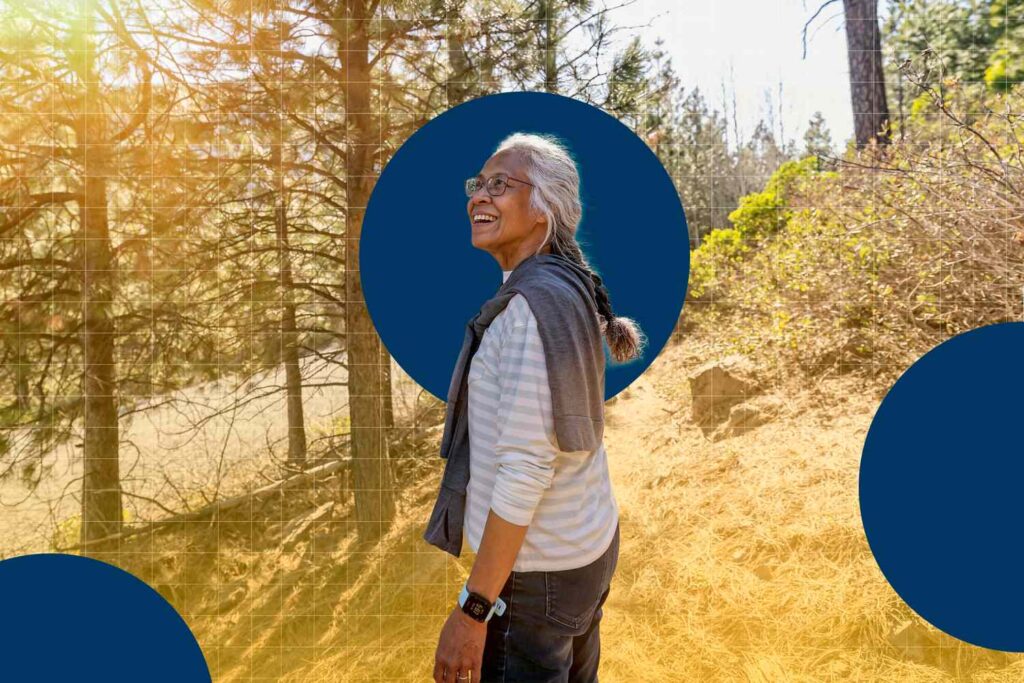- Gerontologist Susie DiGiovanna, M.S. shares her “three A’s” of healthy aging: activate, adult and accept.
- Staying social, active and curious is key to longevity and joyful living, DiGiovanna emphasizes.
- Acceptance of change and planning for the future brings peace, resilience and better quality of life.
For more than 22 years, Susie DiGiovanna, M.S., has worked in social services for a local municipality, helping older adults and their families navigate the many stages of aging. Through her time running programs, offering counseling and visiting seniors in their homes and at hospitals, she’s observed an abundance of examples of what it truly means to age well—and what can hold people back.
“I like to say that I have a front row seat to what healthy aging looks like and what unhealthy aging looks like,” the gerontologist tells EatingWell. “It’s been very, very educational for me personally and professionally, because I’ve gotten to know thousands and thousands of older adults through working at a very active senior center.”
Based on those experiences, DiGiovanna distilled her philosophy into three simple but powerful principles: activating yourself, adulting and accepting new realities. She calls them the “three As of healthy aging,” and she explains how to prioritize these core elements.
Activating Yourself
DiGiovanna emphasizes that healthy adults are continually “activating” themselves through physical movement, connection and curiosity.
“You need to make it an actual concerted effort to be socializing, to be physically active, to be just really into what we now call ‘self-care,’ because those things don’t happen automatically or accidentally,” she says.
Her expert take is backed by science. According to a recent study in the Journal of the American Geriatrics Society, higher social engagement was linked with lower all-cause mortality. More social activity could mean joining a walking group, attending a fitness class at a senior center, hosting neighborhood potlucks or signing up for a book club. It could also be as simple as catching up with family and friends face-to-face on a more regular basis. These things build accountability, structure and joy, all factors that lead to a healthy lifestyle.
“A lot of older adults will say to me, ‘Well, I’m not a joiner, I’ve never been a joiner.’ That’s not a good thing,” DiGiovanna shares. “It is good to enjoy your own company, being alone sometimes, but I would say not being a ‘joiner’ is going to work against you when you get older.”
Adulting
Okay, “adulting” feels pretty obvious, but it’s more than it seems. You may be guilty of not filling out and finalizing the necessary paperwork while in the midst of aging.
“I can’t even begin to tell you how many people who are older, in their 80s or 90s, that still haven’t done a will or a trust, or a healthcare directive, or even told anyone what they want when they die,” DiGiovanna says. “Do they want to be buried or cremated? These are very important things that a lot of times cause more grief for whoever’s left than the person themselves.”
While it may initially feel uncomfortable, these tasks are practical steps to fully embrace aging and life ahead. If you haven’t done so already, this is your reminder to file a will, consider a financial power of attorney, complete a healthcare directive and to talk to your family about the future. And DiGiovanna practices what she preaches, noting that she has completed the check list of healthy aging tasks.
“Once I did all of those things, it felt great,” DiGiovanna, who is 64 herself, shares. “It feels wonderful to tell your loved ones, ‘This is done, I’ve talked to you about my wishes.’ It’s a peaceful feeling.”
Accepting New Realities
This may be the hardest of the bunch, but it’s inevitable—and accepting and adjusting your routine to highlight your needs is a healthy way to welcome change.
“The only thing certain is change,” DiGiovanna notes. “We’re going to continue to change our whole lives.” The expert shares that she sees individuals every day who resist aging by trying to deny their abilities. But straining your body might be doing you more harm than good.
A 2024 study published in BMJ Mental Health found that older adults who were able to cope with life challenges through more resilience had a reduced mortality risk.
DiGiovanna stresses that acceptance doesn’t mean giving up, contrary to popular belief. It means adapting to your needs, whether that be taking specialized exercise classes or focusing on the simple things in life that spark you joy.
“People that accept and say, ‘You know what, I am a senior,’ they have that openness and that curiosity, that’s much more healthy,” she says.
Our Expert Take
Healthy aging is all about flowing with time instead of fighting it. DiGiovanna’s three A’s (activating yourself, adulting and accepting new realities) is a needed nudge to remind us that improved longevity on the surface is living longer, but the quality of a joyful life is the core.
“People that have accepted their mortality seem to have a much better attitude,” she reflects. “They seem to have more joy. They seem to have more appreciation that they’re alive now, that they have the ability to still do some things. So that acceptance piece, I feel, is a very big part of healthy aging.”
Alongside activity, socialization and focusing on your mental health, you can support healthy aging through your diet. Our 7-Day High-Protein Meal Plan for Healthy Aging is a great place to start.

